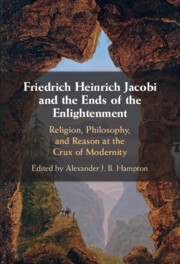 Friedrich Heinrich Jacobi and the Ends of the Enlightenment
Friedrich Heinrich Jacobi and the Ends of the Enlightenment Book contents
- Friedrich Heinrich Jacobi and the Ends of the Enlightenment
- Reviews
- Friedrich Heinrich Jacobi and the Ends of the Enlightenment
- Copyright page
- Dedication
- Epigraph
- Contents
- Contributors
- Foreword
- Acknowledgments
- Abbreviations
- Introduction
- Part I The Critique of Reason: Debates on Rationalism, Empiricism, and Skepticism
- Part II Faith and Revelation: Debates on Theism, Atheism, and Nihilism
- Part III Jacobi and the Revival of Socraticism: The Muenster Circle and Existentialism
- Part IV Jacobi’s Impact on Idealism and Romanticism
- 12 Jacobi and German Idealism
- 13 Jacobi’s Philosophy of Faith in Fichte’s 1794 Wissenschaftslehre
- 14 Jacobi and the Romantics
- 15 Jacobi as Literary Author
- Jacobi Sources
- Index
- References
14 - Jacobi and the Romantics
from Part IV - Jacobi’s Impact on Idealism and Romanticism
Published online by Cambridge University Press: 09 February 2023
- Friedrich Heinrich Jacobi and the Ends of the Enlightenment
- Reviews
- Friedrich Heinrich Jacobi and the Ends of the Enlightenment
- Copyright page
- Dedication
- Epigraph
- Contents
- Contributors
- Foreword
- Acknowledgments
- Abbreviations
- Introduction
- Part I The Critique of Reason: Debates on Rationalism, Empiricism, and Skepticism
- Part II Faith and Revelation: Debates on Theism, Atheism, and Nihilism
- Part III Jacobi and the Revival of Socraticism: The Muenster Circle and Existentialism
- Part IV Jacobi’s Impact on Idealism and Romanticism
- 12 Jacobi and German Idealism
- 13 Jacobi’s Philosophy of Faith in Fichte’s 1794 Wissenschaftslehre
- 14 Jacobi and the Romantics
- 15 Jacobi as Literary Author
- Jacobi Sources
- Index
- References
Summary
Jacobi played a determinative role in shaping the landscape from which German Romanticism would emerge. His critique of the philosophies of both Spinoza and Fichte, and his advocacy of transcendent realism, would deeply influence Early German Romantics such as Schlegel, Novalis and Hölderlin and would go on to shape the thought of Samuel Taylor Coleridge.
- Type
- Chapter
- Information
- Friedrich Heinrich Jacobi and the Ends of the EnlightenmentReligion, Philosophy, and Reason at the Crux of Modernity, pp. 267 - 285Publisher: Cambridge University PressPrint publication year: 2023


